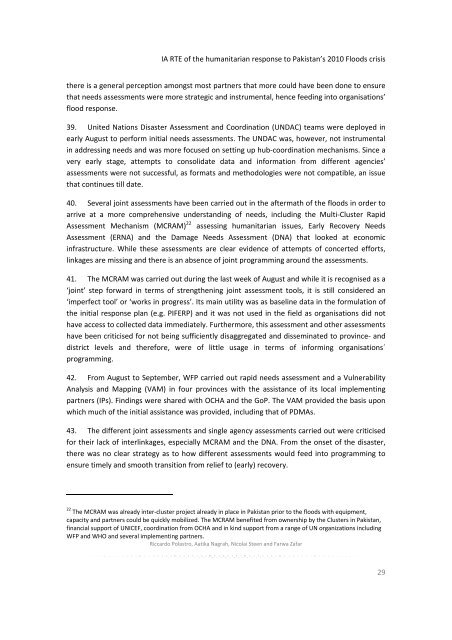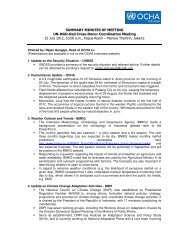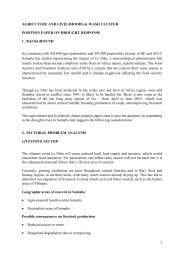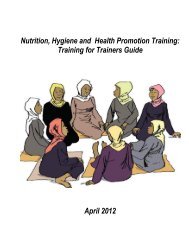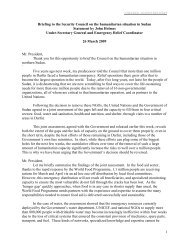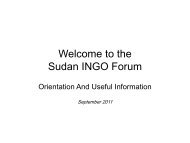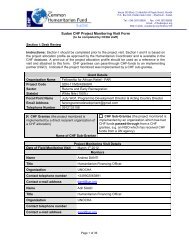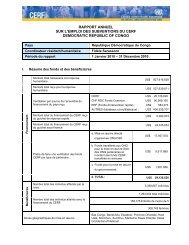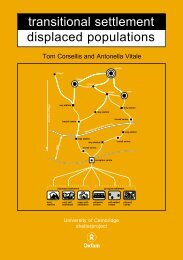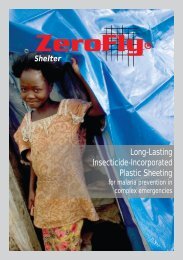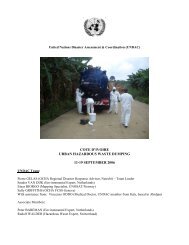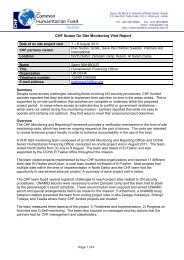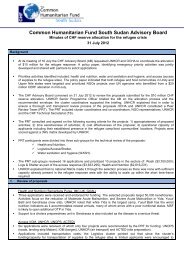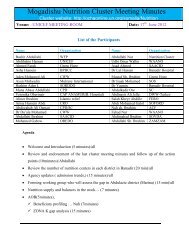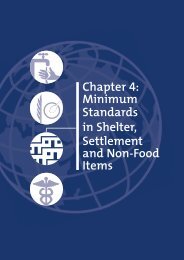Inter-Agency Real Time Evaluation of the Humanitarian ... - OCHANet
Inter-Agency Real Time Evaluation of the Humanitarian ... - OCHANet
Inter-Agency Real Time Evaluation of the Humanitarian ... - OCHANet
Create successful ePaper yourself
Turn your PDF publications into a flip-book with our unique Google optimized e-Paper software.
IA RTE <strong>of</strong> <strong>the</strong> humanitarian response to Pakistan’s 2010 Floods crisis<br />
<strong>the</strong>re is a general perception amongst most partners that more could have been done to ensure<br />
that needs assessments were more strategic and instrumental, hence feeding into organisations’<br />
flood response.<br />
39. United Nations Disaster Assessment and Coordination (UNDAC) teams were deployed in<br />
early August to perform initial needs assessments. The UNDAC was, however, not instrumental<br />
in addressing needs and was more focused on setting up hub‐coordination mechanisms. Since a<br />
very early stage, attempts to consolidate data and information from different agencies’<br />
assessments were not successful, as formats and methodologies were not compatible, an issue<br />
that continues till date.<br />
40. Several joint assessments have been carried out in <strong>the</strong> aftermath <strong>of</strong> <strong>the</strong> floods in order to<br />
arrive at a more comprehensive understanding <strong>of</strong> needs, including <strong>the</strong> Multi‐Cluster Rapid<br />
Assessment Mechanism (MCRAM) 22 assessing humanitarian issues, Early Recovery Needs<br />
Assessment (ERNA) and <strong>the</strong> Damage Needs Assessment (DNA) that looked at economic<br />
infrastructure. While <strong>the</strong>se assessments are clear evidence <strong>of</strong> attempts <strong>of</strong> concerted efforts,<br />
linkages are missing and <strong>the</strong>re is an absence <strong>of</strong> joint programming around <strong>the</strong> assessments.<br />
41. The MCRAM was carried out during <strong>the</strong> last week <strong>of</strong> August and while it is recognised as a<br />
‘joint’ step forward in terms <strong>of</strong> streng<strong>the</strong>ning joint assessment tools, it is still considered an<br />
‘imperfect tool’ or ‘works in progress’. Its main utility was as baseline data in <strong>the</strong> formulation <strong>of</strong><br />
<strong>the</strong> initial response plan (e.g. PIFERP) and it was not used in <strong>the</strong> field as organisations did not<br />
have access to collected data immediately. Fur<strong>the</strong>rmore, this assessment and o<strong>the</strong>r assessments<br />
have been criticised for not being sufficiently disaggregated and disseminated to province‐ and<br />
district levels and <strong>the</strong>refore, were <strong>of</strong> little usage in terms <strong>of</strong> informing organisations´<br />
programming.<br />
42. From August to September, WFP carried out rapid needs assessment and a Vulnerability<br />
Analysis and Mapping (VAM) in four provinces with <strong>the</strong> assistance <strong>of</strong> its local implementing<br />
partners (IPs). Findings were shared with OCHA and <strong>the</strong> GoP. The VAM provided <strong>the</strong> basis upon<br />
which much <strong>of</strong> <strong>the</strong> initial assistance was provided, including that <strong>of</strong> PDMAs.<br />
43. The different joint assessments and single agency assessments carried out were criticised<br />
for <strong>the</strong>ir lack <strong>of</strong> interlinkages, especially MCRAM and <strong>the</strong> DNA. From <strong>the</strong> onset <strong>of</strong> <strong>the</strong> disaster,<br />
<strong>the</strong>re was no clear strategy as to how different assessments would feed into programming to<br />
ensure timely and smooth transition from relief to (early) recovery.<br />
22<br />
The MCRAM was already inter‐cluster project already in place in Pakistan prior to <strong>the</strong> floods with equipment,<br />
capacity and partners could be quickly mobilized. The MCRAM benefited from ownership by <strong>the</strong> Clusters in Pakistan,<br />
financial support <strong>of</strong> UNICEF, coordination from OCHA and in kind support from a range <strong>of</strong> UN organizations including<br />
WFP and WHO and several implementing partners.<br />
Riccardo Polastro, Aatika Nagrah, Nicolai Steen and Farwa Zafar<br />
29


